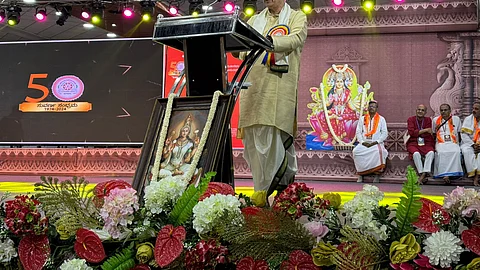

Many Brahmins have contributed to the good of society through history and have also played an important role in the drafting of the Constitution, Justice Krishna N Dixit of the Karnataka High Court said in Bengaluru on Sunday, January 19.
Justice Dixit was speaking at Vishwamitra, the two-day Brahmin convention held on the occasion of the golden jubilee of the Akhila Karnataka Brahmana Mahasabha, at Palace Grounds.
Presiding over the Dharma Sabha, Justice Dixit said that after he became a judge, he distanced himself from the many non-Brahmin nationalist movements he had previously identified with.
“As I understand the term Brahmin, it should not be an indication of caste, but of varna,” he said, adding that after all, Vedavyasa, who had divided up the Vedas, was the son of a fisherwoman, and Valmiki, who wrote the Ramayana, was from either a Scheduled Caste or Scheduled Tribe.
“Have we ever looked down on it (Ramayana)? We have worshipped Rama for centuries and the values of the Ramayana have been incorporated into the Constitution. Among the 32 pictures included in the Constitution, one is of Rama.”
He also said that the scholar PV Kane, who was awarded the Bharata Ratna, had detailed the contributions of many non-Brahmins in his seven-volume work History of Dharmashastras. “So, we should love and respect all communities and move forward together. My remarks should be seen in this context,” he said.
“When we say ‘Brahmin’, it is a matter of pride. Why? Because they gave birth to many doctrines such as Dvaita, Advaita, Vishishta Advaita, and Sudha Advaita. It is your community which gave Basavanna to the world,” he said.
Justice Dixit also talked about the role that Brahmins had played in Ambedkar’s life and in framing the Constitution. He said that it was a Brahmin named “Krishnaji” who told BR Ambedkar to change his name to Ambedkar, as it indicated his caste, Mahar, and even gave him money to enable his education. “That Ambedkar gave us the Constitution.” (BR Ambedkar’s name at birth was Bhimrao Ramji Ambavadekar.)
Justice Dixit said that when the Drafting Committee of the Constitution was formed, three of the seven members were Brahmins. This included Alladi Krishnaswamy Iyer and Gopalaswamy Iyengar. Another Brahmin, BN Rau, was brought in as Constitutional Advisor.
“Even Ambedkar once said at Bhandarkar’s Institute that if BN Rau had not readied the draft Constitution (and given it), it would have taken another 25 years (to be framed),” Justice Dixit said.
He listed the achievements of various Brahmins. He named Kalhana who wrote the book, Rajatarangini, Allama Iqbal, a Kashmiri Brahmin who had written the song “Sare Jahan Se Acha,” and Rabindranath Tagore, whose poem were adopted as the national anthems of two countries — Jana Gana Mana by India, and Amar Sonar Bangla by Bangladesh.
Justice Dixit said that jurist Nani Palkhivala had mentioned a "Madras Brahmin" who had suggested to Nehru the idea of amending the Constitution to enable agrarian reforms.
He urged the Brahmin Mahasabha to think about “the contributions you can make to our great society through this organisation.”
Also present at the event was Justice V Srishananda. “Many people ask why it is necessary to have such a grand event when many people struggle for two meals a day or to pay for education. This event has only been organised to get everyone together and to discuss their issues. Why shouldn’t such an event be organised?” he said.
He peppered his speech with verses by Dasa, Kuvempu, and Sanskrit verses during this speech.
“Let good thoughts come from anywhere. Let them seep into every part of my body,” he said, urging the gathering to follow good teachings regardless of where they come from.
Referring to the bhakti movement, he urged people to carry out all their activities with bhakti. “If there is bhakti in your home, your house becomes a mantralaya, a devalaya,” Justice Srishananda said.
President of the Mahasabha, Ashok Haranahalli, who is also a senior advocate in the Karnataka High Court, said the Mahasabha had resolved to demand the removal of Hindu temples from the control of the Muzrai department. “We don’t see ourselves as a caste group, but others recognise us as Brahmins. Temples should be independent. They should not be under the control of the government and become money-making centres. Just as the institutions by minorities engage in preaching their doctrines at their places of worship, Muzrai temples should become centres of Sanatana Dharma.”
Commenting on the state’s caste census, Ashok also said that the caste census was done unscientifically. “Several people said that the officials had not come to their house. The government should re-do the caste census, and no decisions should be taken based on this census.”
Among the politicians who attended the two-day event were Union Ministers Pralhad Joshi and Shobha Karandlaje, BJP state president BY Vijayendra, BJP leaders R Ashoka, Ravi Subramanya, CK Ramamurthy, and TS Srivatsa, and Congress leaders Minister Dinesh Gundu Rao, and former minister RV Deshpande.